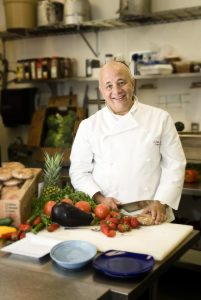
Arthur Gordon ’72 says his UNC philosophy degree and chemistry coursework have helped him remain creative in the kitchen for four decades. (photo by KC Ramsey)
Arthur Gordon, owner of Irregardless Café, is a pioneer in the local food movement
“Food is your health,” says chef/owner Arthur Gordon ’72, as he opens his monthly cooking class in the kitchen of Irregardless Café. “People are starting to understand that their health is directly related to what they eat.”
As he teaches, he jokes, tells stories and explains how chefs build flavors in the dishes served there and why a plant-based diet is important.
His Raleigh landmark restaurant opened in 1975 as the city’s first vegetarian restaurant; in 1985, it became North Carolina’s first smoke-free dining establishment.
Gordon’s restaurant credentials are a bit unusual: a UNC bachelor’s degree in philosophy and coursework in chemistry. The seemingly disparate disciplines have served him well.
“Chemistry is a science where you have to replicate experimental results,” he said. “It’s a lot like developing a recipe and then preparing it consistently. The combination of chemistry — the left-brain analytical side — and philosophy — the right-brain creative side — allows me to engage both sides of my brain, which has helped me become a successful businessman for 42 years.”
Growing up in Durham, Gordon learned to cook from his Grandmother Lena during her twice-annual visits. She would stock their freezer with brisket, soups and her legendary cheese blintzes, which Gordon has had on the weekend brunch menu since the café opened.
After graduation, he ran his family’s fashion business, but longed to attend the Culinary Institute of America. CIA required that students have two years of restaurant experience before entering the program.
Gordon decided, “I’ll just open a restaurant for two years, then go to CIA and get trained to be a real chef.” (More than four decades later, he still hasn’t enrolled.)
It was during his UNC student days that he became a vegetarian as part of a period of activism that included conscientious objection to the Vietnam War. Although he remains a vegetarian, over the years Irregardless has added fish, then poultry and finally other meats to the menu, based on thoughtful discussions with customers and staff.
The café’s comfortable, well-lit dining area, stage and lively bar create just the right client-pleasing chemistry. Gordon moves among the tables greeting customers and catching up on their lives. He nurtures community, starting with his loyal staff. A rotating group of musicians performs every night to the delight of customers who enjoy not only a fine meal, but also music — and on Saturday evenings, dancing. His original customers now bring their grandchildren and great-grandchildren to Irregardless.
Gordon and his wife and restaurant partner, Anya, lead international travel groups that emphasize experiencing local culture. They were committed to using local ingredients, years before it became trendy.
“The challenge to local chefs is convincing customers that the extra cost to offer organic, locally sourced ingredients is worth it by educating them about why they want to buy from local farmers growing organic products,” he explained. “It costs more, but it supports local growers and it’s fresher.”
Gordon’s Well Fed Community Garden, begun in 2012, provides some organic produce to the restaurant. The 1.5-acre garden has a paid staff and community volunteers. Some of what the garden grows is donated to low-income families in the community.
The chef has received numerous accolades for his community contributions, including the Order of the Long Leaf Pine, one of North Carolina’s highest civilian awards.
Creating a changing menu shaped by local and seasonal ingredients continues to challenge his creativity even after decades in the kitchen, Gordon said.
“The ability to take and sense how flavors can be put together, to create something out of good things — I think that’s an innate skill that you can’t teach. I guess that’s why we’re still here.”
By Dianne Gooch Shaw ’71
This story is part of ongoing coverage of UNC’s academic theme “Food For All”.
